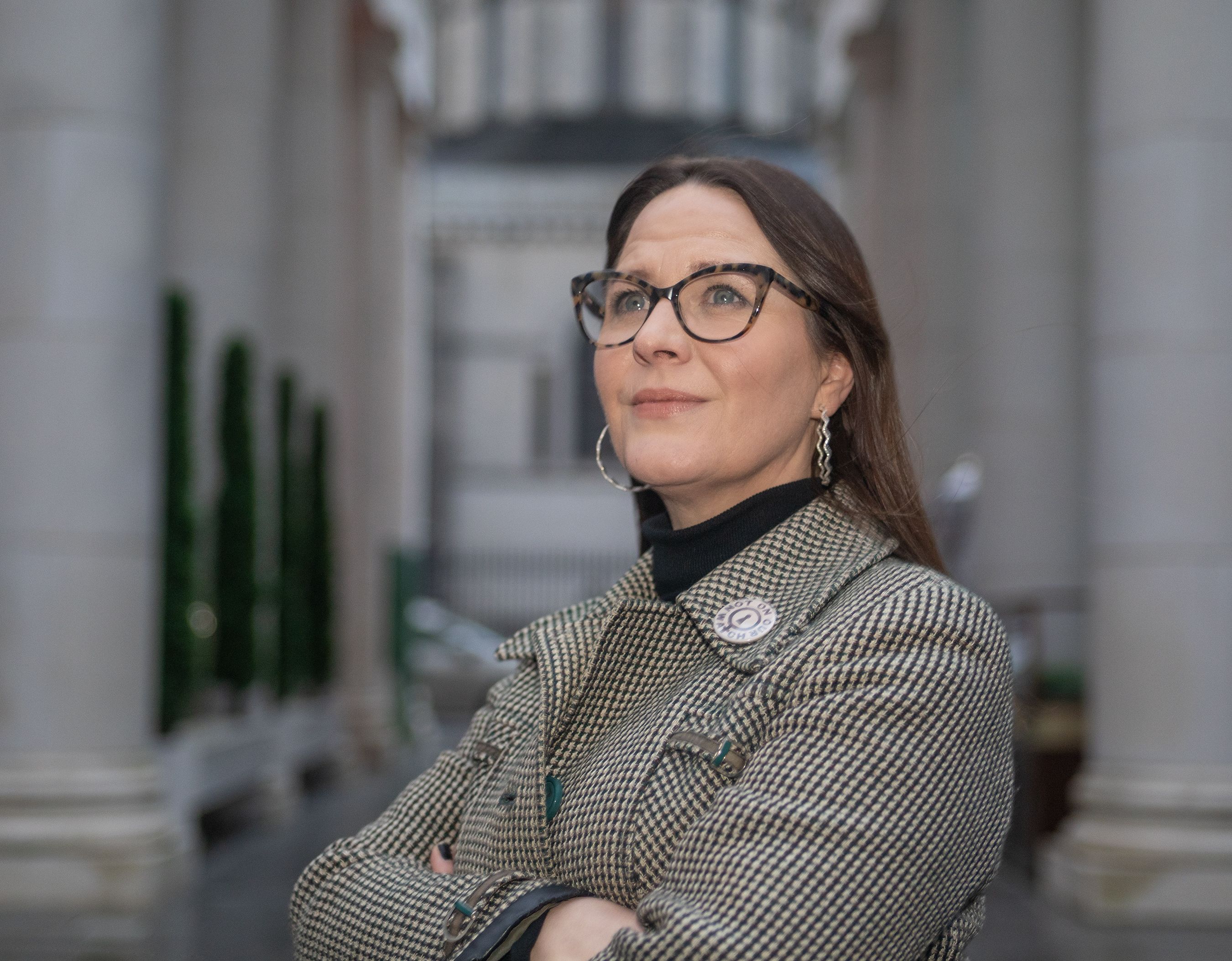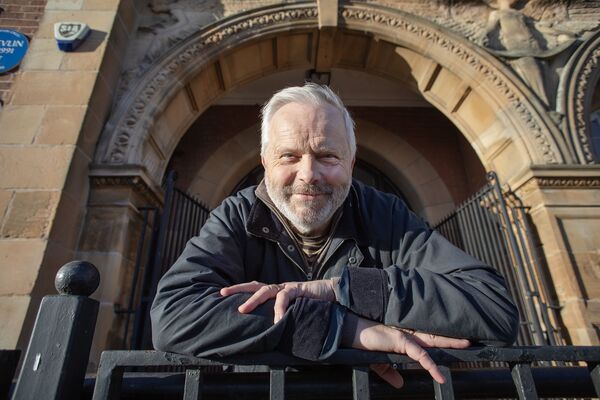WHEN Louise Mathews was invited along by Kabosh’s Paula McFetridge to listen to former staff members of Regina Coeli hostel at a meeting with Unite the Union, little did she know that she had already been hand-picked by the theatre company’s artistic director as the preferred writer to bring the women’s incredible story to the stage.
Months earlier the women had staged a 12-week takeover of the only all-women hostel in the North of Ireland in a last desperate attempt to prevent its closure.
Having heard their story Louise was ‘furious’ enough to agree to take on the commission. However, there was one major hurdle that immediately faced her: The script needed to be ready for rehearsals in little over a month.
“I wasn’t going there as a playwright,” recalls Louise. “I was going to meet all these women and listen to their story and see what the craic was. By the end of the day I was writing their story. But that’s the magic of Paula – that’s her skill.”
Twelve months on and Not On Our Watch is the recipient of the Aisling Arts & Culture Award. It’s a story that has inspired those who have seen it; much like the women it portrays on stage.
While the play is Louise’s first stage production, the Ardoyne woman has always been writing and performing from a young age. Then there was her dance band in the 1990s that she sang with and wrote the lyrics for.
“A lot of the lyrics from the Slipgate songs that we were doing I got from my diaries and from writing years back. I was looking through all these old pages and going, there’s a song there, and there’s a song. We didn’t do too bad, we released an EP and got radio play and played at The Empire and Limelight and places like that and I loved it.”
#DublinTheatre#DerryTheatre #cushendunarts#OpenHouseFestival#FeileAnPhobail#EastSideArts
— Louise Mathews (@LouMathews) May 4, 2023
Get your tickets before they run out the door again 😘🙏✊❤️#WomenDemandBetter#UppaWomen#UppaWorkers #NotOnOurWatch 🙏✊❤️
An honour to write the story of warrior women in society https://t.co/9JXJVqKyWy
A chance meeting with Kate Muldoon in 2003 nudged Louise in a different artistic direction.
“I bumped into Kate Muldoon, a writer from Ardoyne, and she said she was writing a play and said she thought I’d be great as one of the characters. I had been thinking for months that I wanted to get back into acting and it just so happened that I bumped into Kate and that was my first semi-professional play – Time After Time it was called and it was gorgeous, and I met the mighty Jo Egan who was the director.”
Working as a youth leader at the time, Louise won a scholarship to study acting at the Gaiety School of Acting in Dublin.
“I knew that I wanted to professionalise myself and to find a way to earn my money as an artist,” says Louise, reflecting on those days. “I didn’t know if that was going to be as a singer-songwriter or as an actor, so I left it up to fate and applied to LIPA in Liverpool for music and applied to the Gaiety for acting and I just decided to let the fates play and I got a place in the Gaiety which was amazing.”
With her own company Time To Shine, Louise works with young people, putting on productions and constantly creating new shows, which she says only their mums and dads get to see.
“So I’ve been writing for years but didn’t realise I was doing it,” she says. “And then I really wanted to tell the story about my uncle Anthony which was really important to me because I thought his name was going to get lost because when my generation goes who’s going to know about him.
“He was a single man who died young and was gay and I really got this desire to plant him in history and put him on a pedestal where he belonged. So I started writing about him in a wee notebook and then Tinderbox Theatre Company put out a call for people who had ideas for a play that they want to develop and that they’d get mentored by their director Patrick J O’Reilly. My play got accepted – and then the pandemic happened.
“It ended up being like a concept album because we had to keep rewriting and reducing it down because of Covid restrictions. That was the first professional Theatre writing that I did.”
The dust (aka hangover) has settled from the amazing #AislingAwards
— Louise Mathews (@LouMathews) November 26, 2023
Honoured that myself and Kabosh won the Arts and Culture award for #NotOnOurWatch
It was the most beautiful night celebrating the people of our city and those who inspire us.
Thank you so much @aislingevents pic.twitter.com/dQJA6W8mzA
Fast forward to that meeting with the women from Regina Coeli.
“I was absolutely furious and couldn’t believe how much I didn’t get because I knew what was happening – or I thought I did from the news. I was signing petitions and all to keep the hostel open and knew that it was closing but I didn’t realise that they were locked in there and didn’t know that they were still working and doing everything they could to save it, it just hadn’t come across at all.
“Listening to them I was totally passionate about what they were doing and totally passionate about the cause for this story to get out there. I was drummed up and then when I realised that I had to write it in two months the reality dawned, but I just had to and I think coming from where I come from in my life and knowing how easy it is for people in our society for life to get in the way and for trauma to happen, we need a safety net and if you don’t have a safety net for women what does that say about our society? It really, really affected me and made me think, women need a voice here and I got my own fears out of the way and I had to do what had to be done.”
Three actors play all the roles in the play, including the workers and the women who were living in the hostel.
“I couldn’t believe the reaction,” says Louise. “During rehearsals my nerves were shattered and my stomach was in knots giving the script over to the actors at the start because it was still so new. It was only a month since getting it all on to a page and then when I heard the readthrough I thought it was going to be okay – there were still bits that I thought needed to be moved. Then when I saw the first rough run of it, I enjoyed it. I was laughing. I wasn’t critiquing it anymore, I was able to enjoy it and forget that I wrote it, I was able to enjoy what they did with it. It had become a new thing.
“And watching it in the Deer’s Head on the opening night it just felt a bit special, it really did. I was out the window by that stage, it wasn’t about me. It was about these women who are being heard and this happened and this is what is happening to us and our society and it was very special.”
The Regina Coeli story was covered extensively in the press, but Louise believes that unlike theatre, journalism can be too restrictive in its reportage.
Louise, third left, with members of Kabosh Theatre Company and former staff of Regina Coeli picking up the Aisling Award for Arts & Culture from Caroline Ní Dhubhchóin, TG4
“If you are reading a news article you are intellectualising what you’re reading and it’s your mind that’s engaged whereas when it’s theatre everything’s engaged. Your mind’s engaged, and so is your heart and your passion, so I think that’s what the play does, you get to place yourself in every single one of these women’s shoes – be they the guests or the workers and how does it feel for that to happen and is that right for that to happen? A woman came up to me in tears after one of the shows and said, I wish I knew that this was happening, I would have been there.”
Beyond the play Louise says the issues raised are not going away and a women’s hostel must be a priority for any incoming government at Stormont.
And with the success of Not On Our Watch, what’s on the horizon for Louise? “I’m working on two new plays,” she smiles.
No pressure then.








